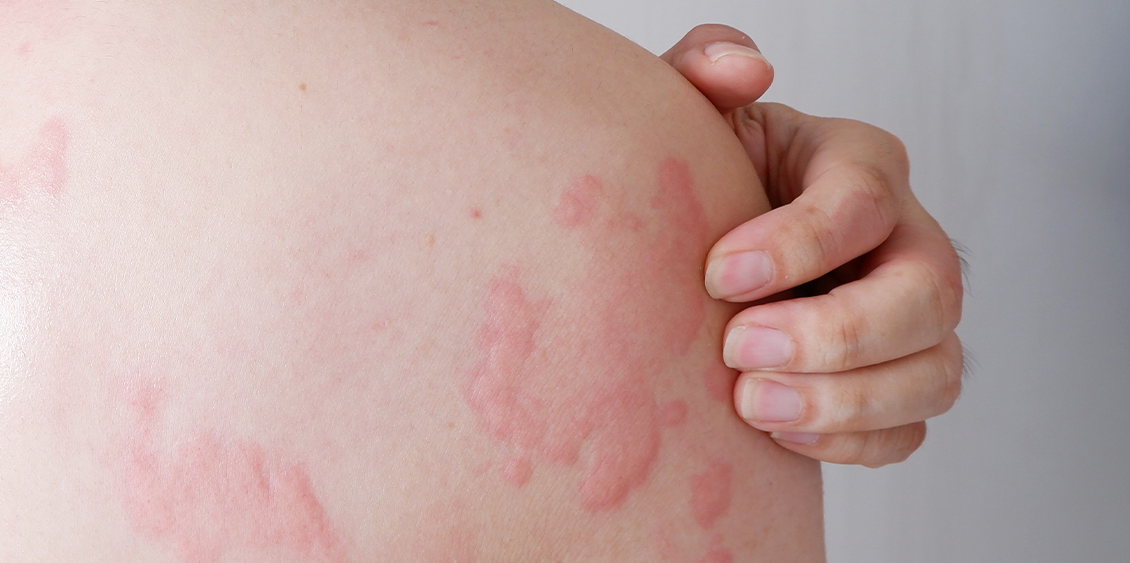Sudden itching, raised patches that appear during flare-ups, poor sleep... hives can quickly turn your daily routine upside down. The good news is that with a few easy adjustments and some simple treatments, most cases will clear up pretty quickly. Don’t worry, we’re here to answer all your questions.

What exactly are hives?
Hives, also known as urticaria, causes raised, itchy pink patches that can pop up in different places on your body.
- Acute urticaria refers to an episode that lasts for anywhere from a few hours to a few days;
- If it lasts longer than six weeks, it’s referred to as chronic urticaria;
- Angioedema is a form of hives that causes deeper swelling (of the lips, eyelids, or hands) and requires extra vigilance, especially when it affects parts of the body around the mouth or throat.
Did you know? In the general population, around 1 in 5 people will experience at least one episode of hives in their lifetime.
What causes hives?
Contrary to popular belief, hives are not always caused by an allergic reaction. Viral infections, medications (antibiotics, anti-inflammatories, etc.), physical stimuli (heat, cold, pressure from a bra or belt, vibrations, exposure to light), emotional stress, and insect bites can all be to blame.
In half of all cases, the exact cause (type of urticaria) remains unknown. If you experience hives flare-ups, we suggest keeping a journal if you can. Write down the foods you ate, any medicines you took, and what you did in the 6 to 12 hours before the hives appeared. This information can help pinpoint possible external irritants more quickly than skin testing in the clinic.
What do hives look like?
The typical symptoms of urticaria are very noticeable, making it easy to tell them apart from eczema:
- raised red patches;
- affected area warm to the touch;
- red patches that do not ooze or scab over.
On darker complexions, the patches can be more discreet or purplish in colour, so it’s primarily the raised quality and pruritus (itching sensation) associated with the patches that are used to distinguish between the two.
Tip: Since hives develop rapidly, it’s a good idea to take photos of them with a reference object (wide shot, then close-up) periodically. This makes it easier for health care professionals to assess the situation.
How are hives different from allergies?
Hives are a condition characterized by skin lesions (raised patches that itch and change location). An allergy is an immune system reaction to a specific trigger (food, medication, insect venom, etc.).
In other words, an allergy can cause hives, but not all hives are associated with allergies. They can also be caused by viral infections, stress, or an unknown cause (idiopathic urticaria).
How long do hives last and are they contagious?
Each lesion generally disappears from a given location in less than 24 hours. A typical flare-up resolves within a few hours or days, if it’s addressed promptly. And rest assured, it’s not contagious.
Consult a health care professional if your episodes last for a long time or come back frequently, or if they significantly disrupt your sleep or activities (e.g., night sweats, marked fatigue).
What exactly is chronic urticaria?
When an episode of hives lasts for longer than six weeks, it’s referred to as chronic urticaria (CU). The preferred treatment is the long-term use of second-generation oral antihistamines, with gradual adjustment if necessary. Very resistant cases may require specialized assessment (e.g., targeted therapies). Your doctor may also look into potential medical conditions associated with hives (e.g., thyroid disease, rheumatoid arthritis, Sjögren’s syndrome).
Chronic urticaria is a relatively common condition, affecting around 1% of the world’s population. In other words, 1 in every 100 people suffers from it. Chronic urticaria can affect children and adults alike, but women are twice as likely as men to be affected.
What’s the difference between hives and eczema?
Hives form migratory patches that fade from a given area within 24 hours, and the skin becomes smooth again between flare-ups.
Eczema causes fixed dry or oozing lesions that are accompanied by a persistent stinging sensation. When in doubt, ask your pharmacist for advice. In the meantime, here are 10 tips to prevent and treat eczema.
What should you do during a hives flare-up?
- Remove the suspected trigger and loosen any tight clothing;
- Take warm showers rather than hot ones;
- Apply cold compresses for 10 to 15 minutes at a time;
- Wear cotton fabrics, which often relieve itching quickly;
- Avoid scratching and pat the zone dry, then apply a cold, fragrance-free emollient (kept in the refrigerator);
- In some cases, a thermal water spray can help soothe the burning sensation.
Tip: In case of a severe hives flare-up, consult your Brunet pharmacist. Our teams will give you the best advice, check your medical history, and refer you to a specialist if necessary. In an emergency, if you have any alarming symptoms, call 911.
How do you prevent hives from coming back?
Adopt a skincare routine designed for sensitive skin
- Use a gentle, fragrance-free cleanser;
- Choose a moisturizer for reactive skin and use hypoallergenic laundry soap;
- Avoid hot baths, irritating chemicals, and sudden changes in temperature;
- Choose loose-fitting clothing made out of breathable fabric and make sure to remove any irritating labels;
- Regular sleep and certain breathing techniques can also soothe the affected areas.
Different skin types react differently to creams, allergens, and other products. Do you know your skin type? Take our quiz and get personalized treatment advice from our cosmetic experts.
Nutrition: should you avoid certain foods?
Some people have classic food allergies (to peanuts or walnuts, seafood, etc.), while others are allergic to foods that are high in histamine (aged cheeses, cured meats, certain exotic fruits, etc.).
In some people, alcohol and spices can make pruritus worse. The idea is not to eliminate everything. We recommend observing one variable at a time to see if there’s a connection between your hives and certain foods. Your pharmacist can help you come up with a plan, so don’t hesitate to ask.
Treatment: what medications can help?
During the day, it’s best to use a non-drowsy option. At night, something with a slight sedative effect may help if the itching is keeping you awake. Most of the recommended treatments involve oral medications. The dose depends on your age, the side effects (e.g., drowsiness) of the drug, and your other medications and potential interactions.
Consult your Brunet pharmacist before taking any medication.
Special cases
For children, the dosage depends on the child’s weight, and more child-friendly forms are often recommended, such as syrups and chewable tablets. We suggest consulting a health care professional if your child has a fever, joint pain, trouble sleeping, or an extensive rash.
During pregnancy and while breastfeeding, some medications are appropriate, while others are not. Rather than self-medicating, confirm each choice with your pharmacist beforehand.
When is it time to consult a doctor?
- Consult your doctor immediately if you experience difficulty breathing, angioedema with swelling of the tongue or throat, a muffled voice, malaise, or repeated vomiting.
- Consult a doctor within 24 to 48 hours if the angioedema is affecting the face, the rash lasts more than 48 to 72 hours, you have a high fever, or you’re having serious trouble sleeping.
- If the flare-ups last more than six weeks, become more frequent, or if you suspect they’re caused by a medication (skin tests may be helpful), you’re strongly advised to seek medical advice as soon as possible.
There are many things that can cause hives. It can sometimes be hard to tell the difference between hives and allergies. In any case, if your hives persist, consult your pharmacist. Our specialists will work with you to find the right care plan for your situation and your skin.
When in doubt, make an appointment with your pharmacist. They’ll be happy to help you figure out the cause of the flare-ups, choose the right treatment, and follow up as needed.
Other articles that might interest you
Living with seasonal allergies
Last updated on July 10, 2025

